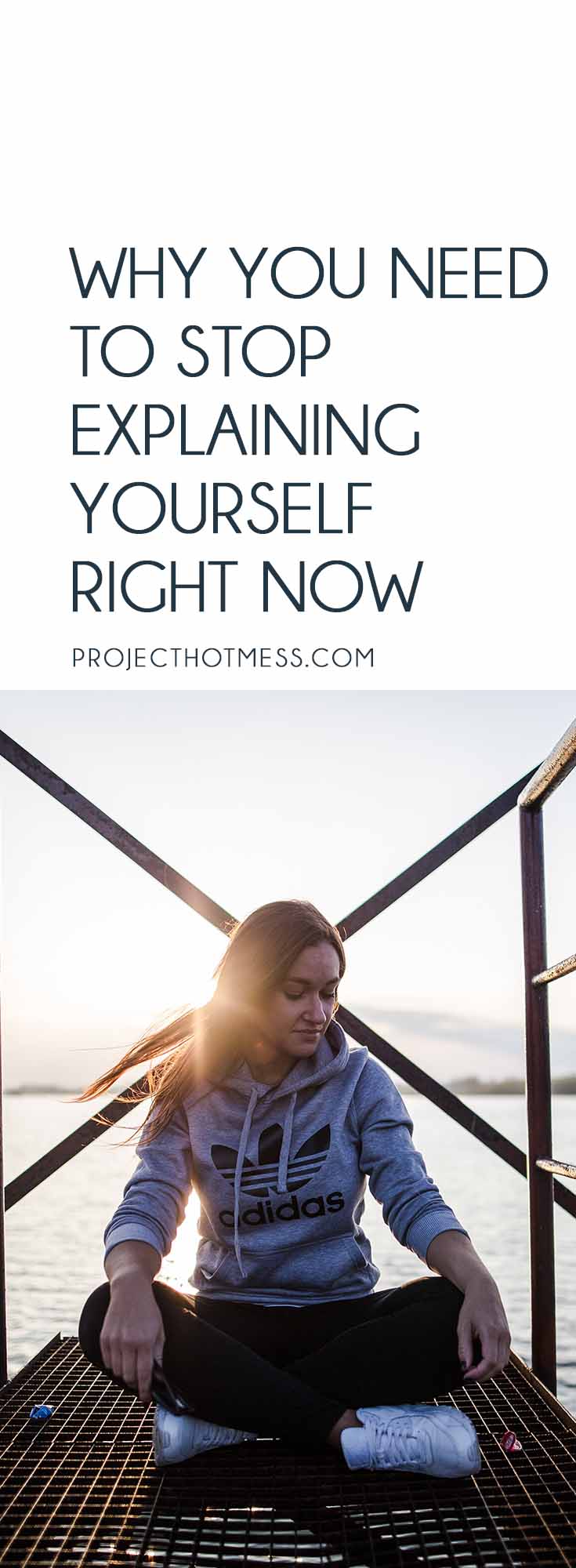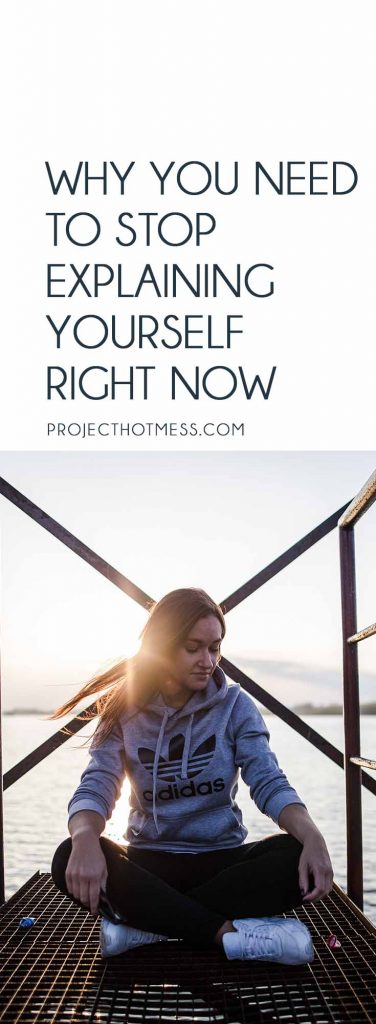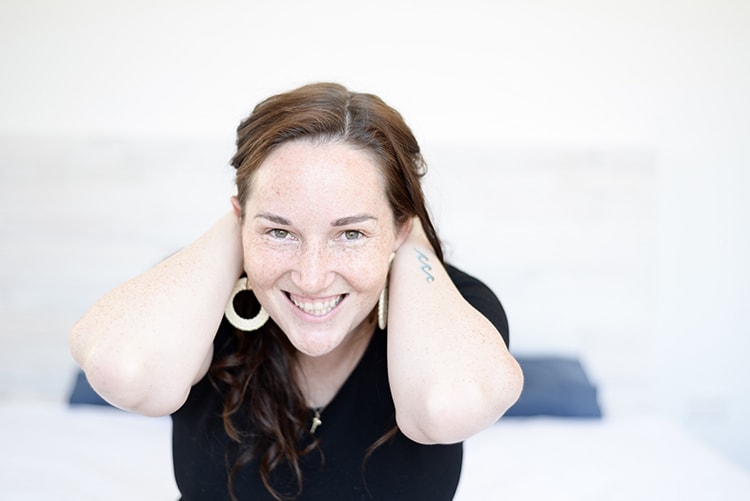Why You Need to Stop Explaining Yourself Right Now
Have you ever been asked a question, found yourself gushing out an awkward explanation for an answer, and then felt pretty silly afterwards? Yeah, me too. It’s called over-explaining. We all do it sometimes, and we’ve got to stop.
This habit of over-explaining ourselves can be a major problem. I’m not talking about meaningful back and forth dialogue where you’re sharing ideas and learning from each other.
No, I’m talking about those moments when you feel uncomfortable and put on the spot, and you start spewing a load of unprovoked justification.
Here’s an example:
BOSS: “Hey, I’m wondering if we can go ahead and change up your work schedule so you get off 3 hours later than you do now. Does that work for you?
YOU: “Umm, well I’m not sure. I’ll check with my husband. I mean, uhh, bedtimes are hard with the kids and everything, and umm, I guess I’ll have to think about it.”
But in your head you’re going, “yeah right. Hell no. Never in a million years.” So maybe a better response would be “Thanks for asking, but that’s not going to work for me right now.”
Why do we feel the need to over-explain? Here’s why it’s a problem, and what we can do to stop it in its tracks.

WHAT WE’RE DOING:
Providing lengthy explanations when it’s not necessary.
Like the previous example, there are situations where we assume that the other person requires an explanation, when in fact they don’t.
While there are circumstances that could use an explanation, more often than not, your answer, statement, question (whatever it may be), is more than enough.
Giving a ton of background information to support our actions or decisions.
Have you ever had an encounter like this?
ACQUAINTANCE: “So, are you still breastfeeding?”
YOU: “Well yeah, for now. I mean, mostly at night. He’s teething so I do it for comfort at this point and he hasn’t bit me or anything and is eating solids pretty well too, and the doctor says it’s good for him and we’ll probably stop soon, and blah blahhhhhh blah..”
Is all of that explanation necessary? Did that person even ask for details?

WHY WE DO IT:
To avoid being judged.
It’s human nature to want to be accepted, and it’s natural to want people to understand where we’re coming from.
In the process of wanting to feel understood, it’s easy to avoid making a bold statement for fear of what the listener might think, so instead we offer up information that only gets in the way of the point we’re trying to make.
To protect other peoples feelings.
This is often times imaginary, peoples feelings are often WAY less affected by our decisions than we think. They’re busy thinking about their own lives and choices instead of worrying about ours.
It can be scary to be bold or blunt because there’s a potential risk of making someone feel bad. Like Eleanor Roosevelt said, “You wouldn’t worry so much about what others think of you if you realized how seldom they do.”
Another example….
MOM: “Honey did you like that shirt I got you?”
DAUGHTER: “Umm, yeah. It’s really cute, I just think it might be a little short for my body. And it doesn’t really go with any pants I have! Bummer!”
In her head, she’s thinking, “No thank you, mom. I haven’t wanted to dress like Madonna since I was in the 6th grade.”
But guess what! That daughter over-explained her way into her mom exchanging the shirt for a bigger size AND getting her some pants to match. Now what?!
To avoid conflict.
It’s much easier to make vague statements, especially regarding hot button topics, to avoid a potential argument. Conflict is scary and uncomfortable, so naturally, we’re going to do things (even unknowingly) to avoid it sometimes.

WHY IT’S A PROBLEM:
It devalues what we’re saying.
When our voice gets clouded with over-explanation, it diminishes the point being made and makes the speaker seem unsure of themselves.
This can hold you back in every arena of your life.
It can stall growth at work, hinder communication in relationships, and generally make you feel less sure of yourself.
It can give people the wrong impression.
Providing too much explanation can actually cause the listener to lose track of your original point.
They may leave the conversation not clearly understanding your thoughts or intentions.
As with the earlier example, the boss asking their employee to work late is hearing “blah blah blah, it’s a MAYBE, blah blah..” Which means the topic will come up again, leading to another awkward encounter.
If that person had made a BOLD statement instead of a lengthy explanation, the boss would have left knowing without a doubt that it’s not something they’re willing to do right now, and everyone can move on.
It makes us feel less confident in ourselves without even realizing it.
Guess what? Stumbling over your words because you perceive a need to explain yourself will only rob you of your confidence.
You probably feel silly after unloading an awkward explanation, and you may actually find it incredibly liberating to just say what you mean. You’ll probably be pleasantly surprised at the mostly positive response you get.

HOW TO STOP:
Be comfortable with silence.
A little known trick used in job interviews is the art of silence. The interviewer asks a question, lets the interviewee answer, and then doesn’t give an immediate response.
Most of the time, the person being interviewed gets uncomfortable with the silence and start talking again.
This is where the person starts blabbing and things get awkward. There’s no need to fill the silence after a statement because that’s usually when over-explaining takes place.
Be comfortable with a beat of silence after you’ve made your statement, but also before you start talking.
Take a second to think about what you’re going to say before it comes out so you can feel confident in your response.
Place value in your own thoughts and decisions.
There’s no reason to feel like you need to defend yourself. Think about why you feel the need to over-explain.
Do you feel unsure of your stance on an issue? Does the person you’re talking to make you uncomfortable?
Give yourself permission to trust your own voice.
Your opinion is just as valid as those around you. Make sure you’re not devaluing your own voice by feeling the need to over-explain.
Practice.
This isn’t going to happen overnight. The first step in practicing the art of no-explanation is to assess when and why you do it.
Take some time to evaluate what it is that’s making you uncomfortable about the given situation, and then practice.
Also, allow yourself time to actually think about your feelings. We can get so caught up in life that we don’t sit down and just think.
It’s a perfect opportunity to evaluate why you feel the way you do, hopefully boosting confidence so over-explaining won’t feel so necessary.
I’ll leave you with this quote from the Chinese philosopher Lao Tzu, and hope that you take the time to realize how awesome you really are, without any explanation.
“Because one believes in oneself, one doesn’t try to convince others. Because one is content with oneself, one doesn’t need others’ approval. Because one accepts oneself, the world accepts him or her. ~Lao Tzu









